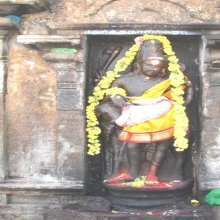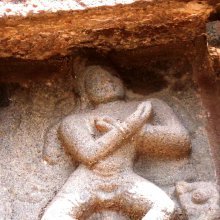Till: 7 definitions
Introduction:
Till means something in Hinduism, Sanskrit. If you want to know the exact meaning, history, etymology or English translation of this term then check out the descriptions on this page. Add your comment or reference to a book if you want to contribute to this summary article.
Till has 5 English definitions available.
Images (photo gallery)
(+10 more images available)
Languages of India and abroad
Sanskrit dictionary
[Deutsch Wörterbuch]
Source: Cologne Digital Sanskrit Dictionaries: Böhtlingk and Roth Grosses Petersburger WörterbuchTill (तिल्ल्):—, tillati gehen, sich bewegen [DHĀTUP. 15, 27, v. l.] für til .
Source: Cologne Digital Sanskrit Dictionaries: Sanskrit-Wörterbuch in kürzerer FassungTill (तिल्ल्):—, tillati ( gatau).
Sanskrit, also spelled संस्कृतम् (saṃskṛtam), is an ancient language of India commonly seen as the grandmother of the Indo-European language family (even English!). Closely allied with Prakrit and Pali, Sanskrit is more exhaustive in both grammar and terms and has the most extensive collection of literature in the world, greatly surpassing its sister-languages Greek and Latin.
See also (Relevant definitions)
Starts with (+22): Tilla, Tilla-kada, Tillaea schimperi, Tillaga, Tillai, Tillai-Citamparam, Tillai-muayiravar, Tillai-tiru-cittirakutam, Tillaikatti, Tillaikkattai, Tillainantu, Tillainayakam, Tillainayakan, Tillainel, Tillaivana, Tillaiviliagam, Tillaiyenney, Tillak, Tillakaada, Tillakada.
Ends with: Standstill, Still.
Full-text (+798): Amaranantika, Adyavadhi, Amarananta, Amarana, Urdhvabahu, Adyapi, Jamvaparyanta, Jomparyanta, Ajavara, Jamvavara, Pratyagamavadhi, Kasati, Karshaka, Pariyanta, Innegam, Gargacaryaca-muhurta, Aratrivivasam, Tom, Anegam, Jaum.
Relevant text
Search found 347 books and stories containing Till; (plurals include: Tills). You can also click to the full overview containing English textual excerpts. Below are direct links for the most relevant articles:
Manusmriti with the Commentary of Medhatithi (by Ganganatha Jha)
Verse 10.84 < [Section IX - Variations in the Functions of the Brāhmaṇa due to Abnormal Conditions]
Verse 9.150 < [Section XXI - Shares of Sons born of Mothers of diverse Castes]
Verse 9.44 < [Section III - To whom does the Child belong?]
The Tattvasangraha [with commentary] (by Ganganatha Jha)
Verse 1631 < [Chapter 19c - (C) On presumption (arthāpatti)]
Verse 2454 < [Chapter 24b - Arguments against the reliability of the Veda (the Revealed Word)]
Verse 1074 < [Chapter 16 - Examination of the Import of Words]
Mahabharata (English) (by Kisari Mohan Ganguli)
Section LXVIII < [Sanatsujata Parva]
Section XXXII < [Arjunabhigamana Parva]
Section LXVI < [Anusasanika Parva]
Samarangana-sutradhara (Summary) (by D. N. Shukla)
Brahma Sutras (Nimbarka commentary) (by Roma Bose)
Brahma-Sūtra 2.3.14 < [Adhikaraṇa 5 - Sūtra 14]
Brahma-Sūtra 4.2.8 < [Adhikaraṇa 5 - Sūtras 7-13]
Brahma-Sūtra 4.2.18 < [Adhikaraṇa 10 - Sūtra 18]
Dr Sir S. Radhakrishnan A Master Mind and Seeker < [July – September, 1988]
Triple Stream - Long Life and Immortality < [April – June, 1998]
Trends of Realism in the Telugu Novel < [April – June, 1982]
Related products
(+44 more products available)











